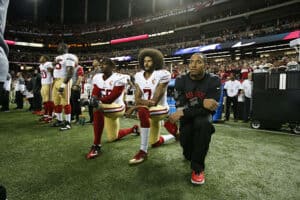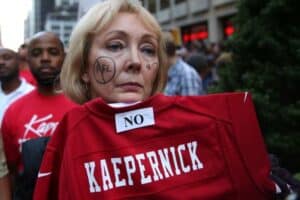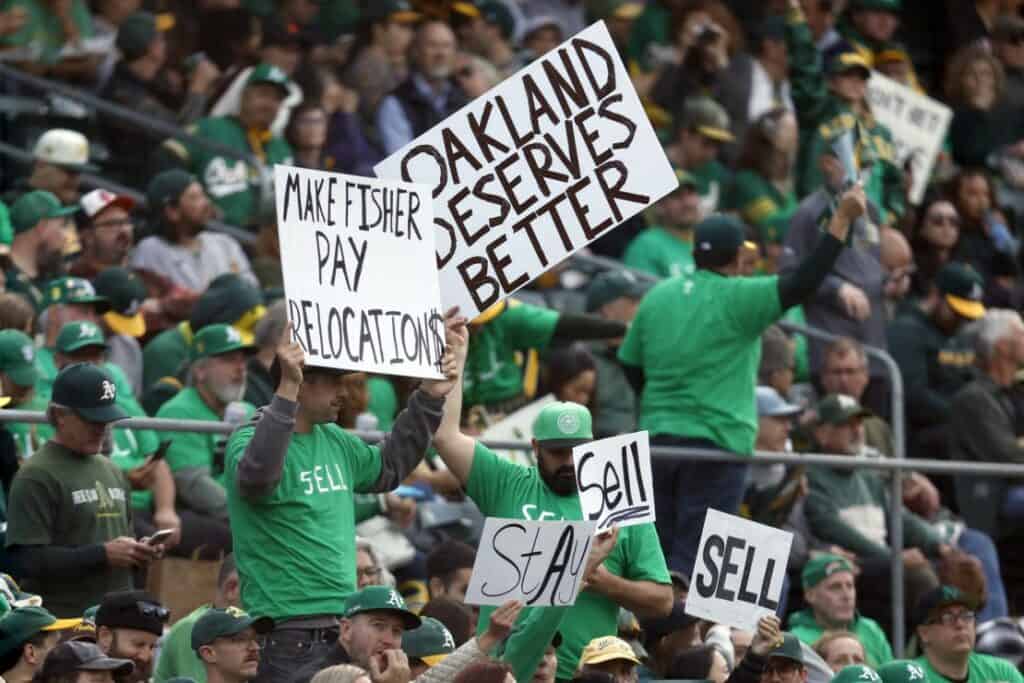
It’s been 2,606 days since Colin Kaepernick has been a starting quarterback in the NFL. During his time in the NFL, Kaepernick raised Hell for his opponents. The talented star was able to beat defenses using his legs and arm. He led his team to the Super Bowl and two NFC Championship Games. Kaepernick was the heart of the San Francisco 49ers.
What happened?
On Sept. 1, 2016, the 49ers faced off against the San Diego Chargers. Before the game, Colin Kaepernick and teammate Eric Reed took a kneel during the national anthem. The kneel during the national anthem was in protest against police brutality on Black Americans. This symbolic act ended up being the turning point for Kaepernick’s career.
NFL fans were outraged by Kaepernick’s kneeling. Many thought that kneeling was a sign of disrespect to those who served in the military. People thought Kaepernick’s actions were unpatriotic and anti-American. In 2016, a study conducted by Reuters found that 61% of Americans did not agree with Colin Kaepernick’s protesting during the singing of The Star-Spangled Banner. 74% of Americans thought his actions were unpatriotic. Fans began to boycott the NFL and viewership dropped 8% in 2016. The NFL released a statement saying that they encourage players to stand during the anthem. Even after Kaepernick was out of the league in 2017, President Donald Trump weighed his opinion on the subject, calling for NFL owners to remove “son of a bitch” players who refused to stand during the anthem.
When Kaepernick began to kneel, many reporters and fans questioned his intentions. “I am not going to stand up to show pride in a flag for a country that oppresses black people and people of color”, Kaepernick told NFL media.

The origin story
A retired Army Veteran named Nate Boyer introduced Kaepernick to the idea of kneeling. Before Kaepernick was kneeling, he started off his protest by sitting during the anthem. When Boyer first saw Kaepernick sitting during the anthem, he was upset and wrote Kaepernick a letter. In the letter, Boyer addressed his frustrations. Following the letter, Kaepernick reached out to Boyer to discuss a new way to protest. That’s when the two agreed that kneeling was a good compromise. In an interview with NPR Boyer stated, “In my opinions and in my experience, kneeling’s never been in our history really seen as a disrespectful act. I mean, people kneel when they get knighted. You kneel to propose to your wife, and you take a knee to pray. And soldiers often take a knee in front of a fallen brother’s grave to pay respects. So I thought, if anything, besides standing, that was the most respectful.”
Life after the 49ers
After San Francisco parted ways with the quarterback, Kaepernick continued to advocate against police brutality. Following the 2016 NFL season, Kaepernick donated 1 million dollars of his annual salary towards causes that advocated against police brutality. Kaepernick continued to try to land a spot on an NFL roster, but unfortunately, he never did. In 2017, Kaepernick and his former teammate Eric Reed filed a lawsuit against the NFL for discrimination. In 2019, the two were awarded less than 10 million dollars for grievances.
Whether you like it or not, it started a discussion.
Kaepernick’s decision to protest sparked discussion across the nation. A rather taboo topic turned into a free-for-all discussion about race and equality. Police brutality became a spotlight issue in the United States, all because Kaepernick kneeled.
If you don’t agree with Kaepernick’s kneeling, I ask you to put that to the side and listen to what his message was. Black Americans only make up 12% of the population, but make up 27% of fatal shootings by police. Black Americans are 5 times more likely to be shot by police than White people.
Kaepernick sacrificed his career and passion to send a message to others. Black Americans are tired. Change needs to be made.




